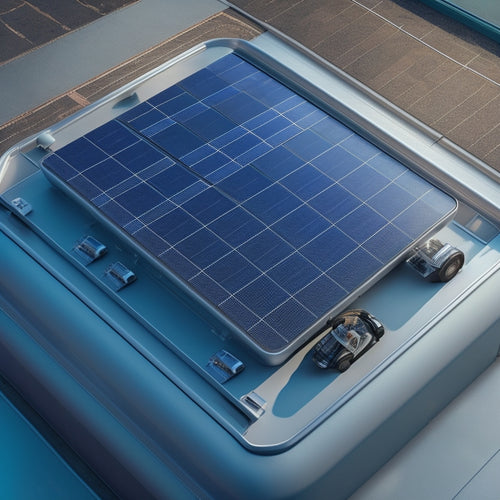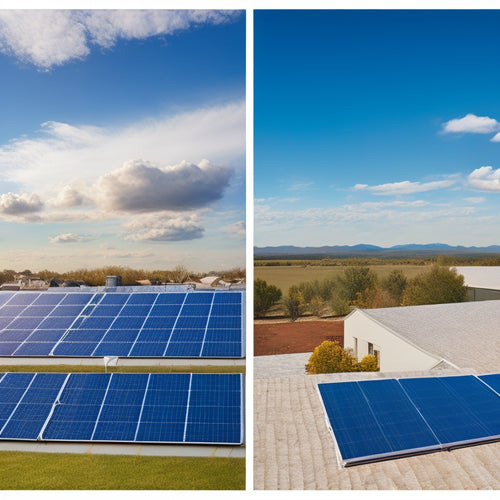
Recommended Home Solar Battery Backup Systems
Share
When selecting a home solar battery backup system, you'll want to evaluate top brands like Tesla's Powerwall, LG, and Sonnen, each offering unique benefits. To make an informed decision, assess key factors such as battery performance, warranty, cost, and compatibility. For small to medium homes, systems with modular expandability and accurate energy needs calculation are essential. You'll also want to investigate different energy storage options, including lithium-ion, lead-acid, and saltwater batteries. As you navigate the intricacies of backup power solutions, keep in mind that whole house backup systems, grid-tie inverter compatibility, and warranty support are all significant aspects to examine further.
Key Takeaways
- Consider top brands like Tesla, LG, and Sonnen, evaluating factors like battery performance, warranty, cost, and compatibility for informed decision-making.
- Choose the right battery type, such as lithium-ion, lead-acid, or saltwater, based on energy density, lifespan, and maintenance needs.
- Ensure the system is sized correctly for your energy needs, considering capacity, depth of discharge, and energy management systems for optimal performance.
- Look for modular expandability and scalability in your system to adapt to changing energy needs and ensure a smooth transition during grid outages.
- Evaluate warranty and maintenance support, including warranty terms, maintenance plans, and on-site support, to ensure long-term reliability and performance.
Top Solar Battery Backup Brands
Investigate the top solar battery backup brands that have revolutionized the industry with their innovative products and state-of-the-art technology.
You'll find that companies like Tesla, LG, and Sonnen are leading the charge with their advanced solutions. When it comes to solar brand comparisons, each brand has its unique strengths and weaknesses.
For instance, Tesla's Powerwall is known for its sleek design and seamless integration with their solar panels. LG, on the other hand, offers a range of battery options with varying capacities to suit different energy needs.
Sonnen, a pioneer in energy storage, boasts exceptional battery performance reviews with its eco-friendly and long-lasting batteries.
When evaluating these brands, you'll want to evaluate factors like battery performance, warranty, and cost.
You'll also want to assess the compatibility of each system with your existing solar panel setup. By doing your research and assessing the pros and cons of each brand, you'll be able to make an informed decision that meets your energy needs and budget.
Systems for Small to Medium Homes
When designing a solar battery backup system for your small to medium home, you'll need to take into account the essentials, such as energy efficiency, load calculation, and system sizing.
You'll also need to choose from various energy storage options, including lead-acid, lithium-ion, and saltwater batteries, each with their own pros and cons.
Your backup power solution should guarantee smooth shift during grid outages, so you'll want to select a system that can meet your specific power needs.
Small Home Essentials
How much backup power do you need to safeguard your small to medium home from grid outages? As you consider energy efficiency and sustainable living, it is crucial to determine your energy requirements. For small homes, a backup system with 5-10 kilowatt-hours (kWh) of capacity is usually sufficient to power essential appliances during an outage.
Here's a breakdown of the typical energy needs for small homes:
| Appliance | Power Requirement (Watts) |
|---|---|
| Refrigerator | 150-200 |
| Lights (5-10) | 50-100 |
| TV | 50-100 |
| Computer | 65-250 |
| Medical Equipment (e.g., oxygen concentrator) | 100-500 |
When selecting a solar battery backup system, consider the total wattage of your essential appliances and the number of hours you want to power them during an outage. For example, if you need to power a refrigerator, lights, and a TV for 4 hours, you'll require a system with at least 2-3 kWh of capacity. Look for systems that offer modular expandability to scale up or down based on your changing energy needs.
Energy Storage Options
Several energy storage options are available for small to medium homes, each catering to specific needs and budgets.
When selecting an energy storage system, you'll want to take into account factors such as capacity, depth of discharge, and compatibility with your existing solar panel system.
You have various solar battery technologies to choose from, including lithium-ion, lead-acid, and saltwater batteries.
Each type has its advantages and disadvantages, so it's crucial to research and compare them before making a decision.
- Lithium-ion batteries offer high energy density and a long lifespan, making them a popular choice for home energy storage.
- Lead-acid batteries are a more affordable option, but they're heavier and less efficient.
- Saltwater batteries are a newer technology that offers a non-toxic and environmentally friendly alternative.
In addition to solar battery technologies, you'll also need to take into account energy management systems that can optimize your energy storage and consumption.
These systems can help you monitor your energy usage, predict your energy needs, and make adjustments in real-time to guarantee you're getting the most out of your solar battery backup system.
Backup Power Solutions
With your energy storage system in place, you're now ready to investigate backup power solutions customized to small to medium homes. These solutions are designed to provide reliable power during grid outages, ensuring your essential appliances remain operational.
When selecting a backup power solution, consider the following factors: energy storage capacity, inverter power rating, and system scalability.
Conduct a cost analysis to determine the most economical option for your specific needs. A 5-10 kW system is typically suitable for small to medium homes, providing sufficient power for refrigeration, lighting, and communication devices.
Installation tips include ensuring the system is installed in a well-ventilated area, away from combustible materials, and that the battery bank is properly sized for your energy storage needs.
Some popular backup power solutions for small to medium homes include the Tesla Powerwall, LG Chem RESU, and Generac PWRcell.
These systems offer advanced features such as remote monitoring, automatic backup, and smart energy management.
Large Capacity Battery Options
When you need to power your entire home during an outage, a large capacity battery is essential. You'll want a battery that can provide enough energy to support your entire household, not just a few vital appliances.
Large capacity battery options come in various types, including lithium-ion, lead-acid, and saltwater batteries. Each type has its own energy efficiency and performance metrics, so it's important to choose the right one for your specific needs.
Some key considerations for large capacity batteries include:
-
Installation options: Will you need to upgrade your electrical panel or install a separate subpanel?
-
Cost analysis: How much will the battery cost, and what's the expected return on investment?
-
Safety features: Are the batteries designed with built-in safety features, such as thermal management and overcharge protection?
Whole House Backup Systems
You've selected a large capacity battery that meets your energy needs, now it's time to contemplate the whole house backup system that will integrate with it. This system will guarantee your entire home remains powered during an outage, giving you peace of mind and uninterrupted functionality.
The system capacity you choose will directly impact the number of appliances and devices you can power simultaneously.
When selecting a whole house backup system, consider factors such as system capacity, installation costs, and compatibility with your existing electrical infrastructure. A higher system capacity will provide more power, but will also increase installation costs.
Be certain to calculate your energy needs accurately to avoid overspending on a system that's too large.
Additionally, consider the type of backup system you need. Do you require a system that can power your entire home, or just essential appliances like lights, refrigeration, and medical equipment?
Grid-Tie Inverter Compatibility
Your whole house backup system's compatibility with a grid-tie inverter is essential to confirm seamless integration and peak performance.
This integration enables your system to optimize solar performance, assuring you get the most out of your solar panels.
When selecting a grid-tie inverter for your whole house backup system, consider the following key factors:
-
Battery inverter integration: Verify the inverter is compatible with your battery type and can optimize charging and discharging.
-
Solar performance optimization: Choose an inverter that can track the maximum power point of your solar array, maximizing energy production.
-
System monitoring and control: Opt for an inverter with advanced monitoring and control capabilities, allowing you to track performance and make adjustments as needed.
Lithium-Ion Battery Advantages
You'll find that lithium-ion batteries offer several advantages that make them an attractive option for home solar battery backup systems.
They boast a longer cycle life, which means they can charge and discharge more times before their capacity starts to degrade.
Additionally, they've higher energy density and lower self-discharge rates, allowing you to store more power in a smaller space while minimizing energy loss over time.
Longer Cycle Life
As homeowners invest in home solar battery backup systems, they expect a reliable and efficient energy storage solution. One of the key benefits of lithium-ion batteries is their longer cycle life, which directly impacts the overall performance of your system.
A longer cycle life means your battery can charge and discharge more times before its capacity starts to degrade.
Lithium-ion batteries outperform traditional lead-acid batteries in this regard, offering:
-
Up to 5,000 cycles: Lithium-ion batteries can last for 10-15 years or more, depending on usage and maintenance. This means you can enjoy a longer period of reliable energy backup without worrying about frequent replacements.
-
Improved battery efficiency: Lithium-ion batteries maintain their capacity even after thousands of cycles, ensuring consistent performance and energy output. This results in better overall system efficiency and reduced energy waste.
-
Reduced maintenance costs: With a longer cycle life, you'll need to replace your batteries less often, saving you money on maintenance and replacement costs over time.
Higher Energy Density
The system's overall energy storage capacity is greatly enhanced by lithium-ion batteries' higher energy density, which allows them to pack more power per unit of weight and volume. This means you can store more energy in a smaller space, making them ideal for home solar battery backup systems where space is often limited.
The energy density benefits of lithium-ion batteries are significant, with some models offering up to 250 Wh/kg, compared to lead-acid batteries which typically offer around 30-40 Wh/kg. When comparing different battery options, energy density is a key metric to evaluate, as it directly impacts the system's overall performance and functionality.
Lower Self-Discharge
In contrast to lead-acid batteries, which can lose up to 50% of their stored energy over just three months, lithium-ion batteries boast a considerably lower self-discharge rate, typically ranging from 2% to 3% per month.
This means you'll experience less energy loss over time, resulting in more efficient battery performance.
When you opt for lithium-ion batteries, you can expect:
-
Improved battery efficiency: With lower self-discharge rates, you'll enjoy a more efficient energy storage system that provides reliable power when you need it most.
-
Reduced maintenance: Unlike lead-acid batteries, lithium-ion batteries require less maintenance, as they're less prone to degradation and can withstand more charge cycles.
-
Enhanced performance: By minimizing discharge rates, lithium-ion batteries guarantee a more consistent flow of energy, making them ideal for home solar battery backup systems.
Lead-Acid Battery Alternatives
You're likely familiar with lead-acid batteries, the traditional choice for home solar battery backup systems. However, they've some limitations, such as low depth of discharge, short lifespan, and maintenance requirements.
Fortunately, there are alternatives that offer improved performance and sustainability benefits.
Lithium-ion batteries, for instance, have a higher energy density, longer lifespan, and lower maintenance needs compared to lead-acid batteries. They also have a deeper depth of discharge, allowing you to use more of the stored energy.
While lithium-ion batteries are more expensive upfront, their longer lifespan and lower maintenance costs make them a more cost-effective option in the long run.
Another alternative is saltwater batteries, which use a saltwater electrolyte instead of acid. They're non-toxic, non-flammable, and more environmentally friendly than lead-acid batteries.
Saltwater batteries also have a longer lifespan and require less maintenance. While they're still a relatively new technology, they show promising results for home solar battery backup systems.
When considering alternatives to lead-acid batteries, it's crucial to weigh the cost comparison and sustainability benefits to find the best fit for your needs.
DIY Installation Considerations
Your solar battery backup system's performance relies heavily on a proper installation, and opting for a DIY approach can be cost-effective, but it requires careful consideration of several key factors.
Before you start, make certain you have the necessary installation tools and take necessary safety precautions to avoid electrical shocks or other hazards.
- Familiarize yourself with local regulations and verify your system meets all requirements
- Correctly size your system to match your energy needs and guarantee peak performance
- Plan battery placement and wiring connections to minimize energy loss and maximize efficiency
Additionally, consider the cost implications of a DIY installation, including the cost of materials and any potential mistakes.
It's crucial to follow proper installation procedures to avoid voiding your system's warranty. By doing so, you'll guarantee a safe, efficient, and reliable solar battery backup system that meets your energy needs.
With proper planning and execution, you can enjoy the benefits of a DIY installation while minimizing the risks.
Warranty and Maintenance Support
Three essential aspects of your solar battery backup system are warranty, maintenance, and support. When evaluating different systems, you'll want to carefully review the warranty terms to guarantee you're protected in case of defects or malfunctions.
Look for an extensive warranty that covers both parts and labor for at least 10 years. Additionally, consider the maintenance plans offered by the manufacturer. Will they provide regular software updates and monitoring to guarantee your system remains optimized? Are they available for on-site maintenance and repairs?
A reliable maintenance plan can help prevent issues and guarantee your system operates at peak performance. You should also assess the level of support provided by the manufacturer. Do they offer 24/7 technical support, or are their support teams only available during limited hours?
Are they responsive to customer inquiries and concerns? A manufacturer that stands behind their product with extensive warranty terms, maintenance plans, and reliable support can give you peace of mind and protect your investment in your solar battery backup system.
Frequently Asked Questions
Can I Use a Solar Battery Backup System With a Septic System?
Curiously, you're not alone in wondering if solar battery backup systems play nice with septic systems. Rest guaranteed, you can integrate solar energy with your septic system, as long as you confirm the backup system's electrical components are safely isolated from water and moisture.
Are Solar Battery Backup Systems Eligible for Government Incentives?
You'll be eligible for government incentives, like tax credits and federal rebates, if your solar battery backup system meets specific eligibility criteria, varying by state regulations, which can markedly offset installation costs and support your pursuit of energy independence through efficient systems.
Can I Add More Batteries to My System in the Future?
"Absence of planning is planning to fail" - with a scalable system, you can add more batteries in the future, ensuring seamless integration and peak performance, as long as you prioritize battery compatibility for effortless future expansion.
Do Solar Battery Backup Systems Work With Electric Vehicle Charging?
You'll be glad to know that most solar battery backup systems can support EV charging, but it's essential to verify battery compatibility to avoid power limitations; check your system's capacity and charging speed to determine its EV charging capabilities.
Can I Use a Generator With My Solar Battery Backup System?
You can use a generator with your solar battery backup system, but you'll need to verify generator compatibility and proper solar system integration to avoid power conflicts and optimize energy harvesting.
Related Posts
-

Top Solar Panels for Car Battery Maintenance
When selecting top solar panels for car battery maintenance, consider high-efficiency models with high wattage output...
-

Why Cities Need Smart Charging Infrastructure Now
You're about to experience a tidal wave of electric vehicles hitting your city's streets, and it's essential you're p...
-

Tracking Solar Panels Vs Fixed Panels Cost Savings
When considering solar panel options, you'll want to weigh the cost savings of tracking solar panels versus fixed pan...


